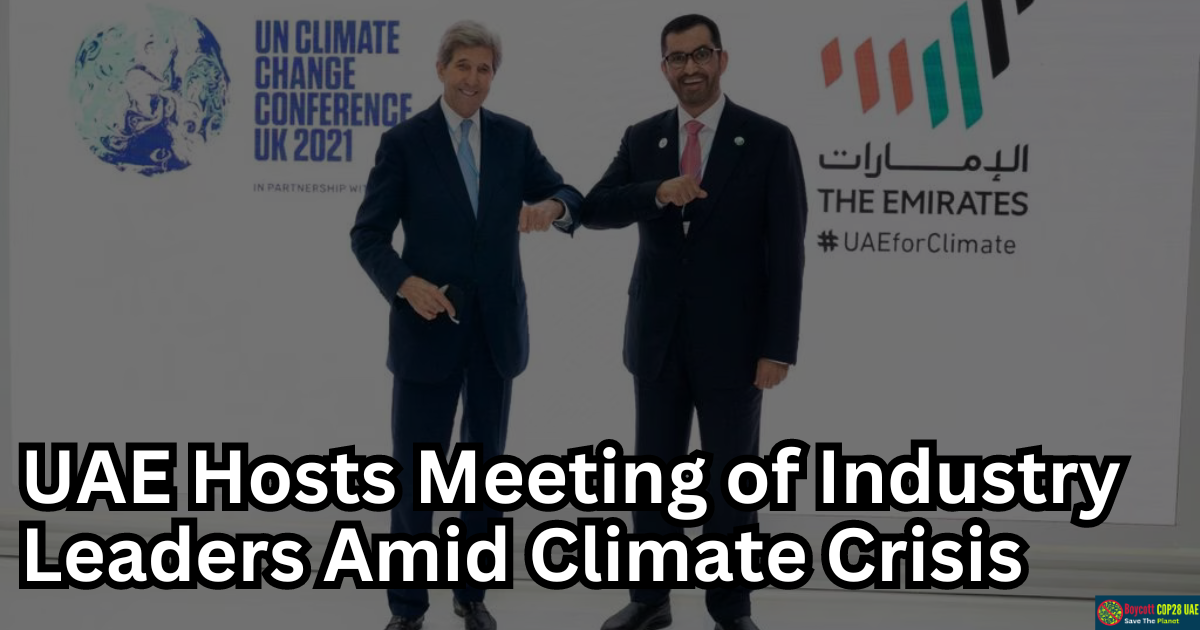In a groundbreaking effort to address the looming climate crisis, top executives from major oil and gas companies convened in the United Arab Emirates (UAE) on Sunday to engage in crucial discussions with heavy industry leaders. The aim of this unprecedented gathering was to solidify a resolute commitment to reducing carbon emissions, setting the stage for the upcoming United Nations Climate Change Conference, known as COP28. Scheduled to be held in Dubai from November 30 to December 12, COP28 is viewed as a pivotal opportunity for governments to intensify their efforts in curbing global warming, given the worrisome reports suggesting that countries are falling short of their commitments to limit the rise in global temperatures to a critical 1.5 degrees Celsius.
Adnan Amin, CEO of COP28, emphasized the uniqueness of this gathering, which brought together both the demand and supply sides of emissions. “What we have done today is something quite unprecedented in the COP process, to bring together both the demand and supply side in terms of emissions,” said Amin. The primary goal was to encourage major industry players to make concrete commitments to decarbonization that could significantly contribute to mitigating global warming.
“We are hoping to reach this agreement before COP28 and then to align on how best this will be positioned at the COP,” Amin added. The event witnessed the participation of CEOs representing over 50 companies from the oil and gas sector, representing the supply side of emissions, and leaders from the aluminium, steel, and cement industries, which constitute the energy demand side.
This momentous gathering, convened by COP28 President Sultan al-Jaber, enjoyed the presence of US Climate Envoy John Kerry. The discussions encompassed a wide array of critical issues, including the commercialization of hydrogen, the scaling up of carbon capture technologies, methane reduction strategies, and the expansion of renewable energy sources, according to a statement released by COP28.
Jaber, the UAE’s conference president, has been vocal about involving the oil and gas industry in climate change dialogues. He has consistently urged the energy sector to achieve net-zero emissions by 2050 or sooner, emphasizing the need for a collective commitment to achieving near-zero methane emissions by 2030. But what about their own country? His country UAE is planning to increase oil import and export so how do they achieve net zero emission?
As COP28 approaches, a significant divide remains among nations, with some advocating for a decisive plan to phase out planet-warming fossil fuels while others insist on preserving the role of coal, oil, and natural gas. Adnan Amin underscored the significance of the oil and gas industry’s potential commitment to decarbonization and methane reduction, describing it as a monumental contribution to the global climate debate.
“If the oil and gas industry signs up to decarbonization agreements and methane abatement, that is a huge contribution to the debate,” Amin said. “It will be the first COP that we can measure the carbon that we are taking off the table.”
UAE’s Environmental Challenge Amidst Oil Industry Dominance
While the UAE takes center stage in hosting the historic gathering of industry leaders dedicated to addressing climate change, it is crucial to recognize the unique environmental challenges faced by this nation, primarily linked to its substantial involvement in the oil industry and fossil fuel production. Despite its role as a regional economic powerhouse and an emblem of modernity, the UAE grapples with a complex environmental crisis, chiefly stemming from its heavy reliance on oil and the environmental consequences that accompany it.
One of the UAE’s most pressing concerns is its carbon footprint, largely driven by its extensive oil and gas sector. Oil extraction, production, and export have catapulted the nation into the ranks of top global emitters of carbon dioxide. These emissions have profound implications for the UAE’s contribution to global warming and its ability to adhere to international climate agreements.
Furthermore, the UAE faces a grave challenge in tackling the environmental consequences of its oil industry, particularly the pollution of air and water resources. The extraction and refining of fossil fuels generate pollutants and hazardous chemicals that can contaminate the air residents breathe and the water they rely on for drinking and irrigation. This pollution poses health risks, disrupts fragile ecosystems, and threatens biodiversity.
The UAE’s heavy reliance on fossil fuels extends beyond its borders by exporting oil and gas, contributing to carbon emissions worldwide. This interconnectedness underscores the urgency for the UAE to engage in international climate dialogues and take decisive domestic action to reduce its carbon footprint and transition to cleaner and more sustainable energy sources.






